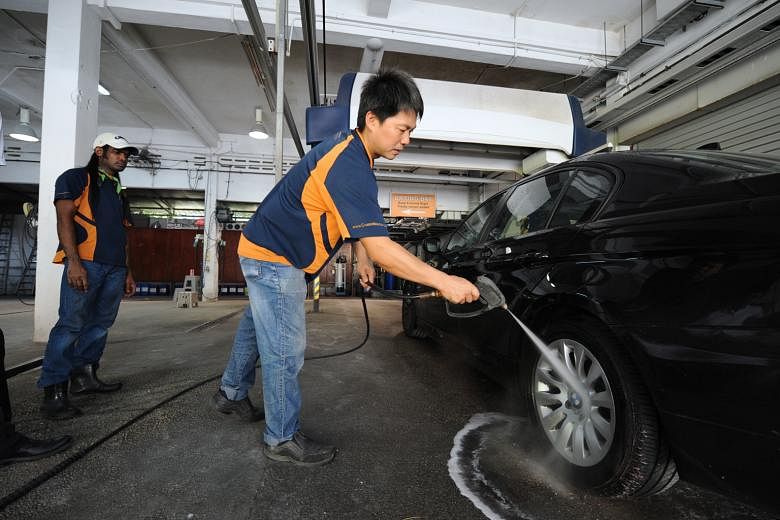Washing your vehicle at car grooming firm Groomwerkz takes under 10 minutes, thanks to water treated by a local start-up.
Home-grown water treatment company De.Mem has been treating water to make it de-ionised for Groomwerkz's car wash services since March this year.
As the treated water does not leave residue marks on car surfaces, less time is needed to wipe them.
"Now, even if the cars are not completely wiped dry, it is okay. The water just evaporates without any residual minerals from tap water," said Groomwerkz managing director Tan Thiam Yong, 43.
The firm now saves about $1,500 each month on manpower costs.
Previously, Mr Tan needed at least two people to wipe the cars, but now he requires just one.
Groomwerkz, which has an outlet in Senang Crescent, washes about 60 to 100 cars each day.
De.Mem is a spin-off from Nanyang Technological University's (NTU) Nanyang Environment and Water Research Institute (Newri).
The water treatment system it installed in the client's premises is able to produce de-ionised water - or water without minerals - for the car grooming company.
Since 2014, when it was set up, De.Mem has made more than $1 million in revenue from clients here and abroad. It also treats waste water from multinational companies from different sectors such as electronics and oil and gas.
The chief technology officer of De.Mem, Dr Adrian Yeo, a former researcher at Newri, said every firm here that produces waste water will have to treat it to ensure it is safe and clean before discharging it into the sewers.
He said: "As opposed to discharging the water back into the sewer, De.Mem recycles the water on-site, treating and bringing it back to PUB standards. We then send it back to the client, and charge a unit cost lower than what it costs for the firm to buy the water from PUB."
Dr Lim Jui, chief executive officer of NTUitive, NTU's commercialisation arm, said: "De.Mem has demonstrated great business acumen since it was founded. To achieve revenues of $1.2 million in just two years is a remarkable achievement rarely seen in the start-up world."
The start-up has also drawn $3.5 million in grants and investments such as those from venture capitalist firm New Asia Investments.
It now manages more than 10 water and waste water treatment plants in Singapore and Vietnam. Over in Can Giuoc in Vietnam's Long An province, for instance, it has installed a water plant so that 500 cubic metres of clean water can be supplied to 100 households daily.
Meanwhile, Mr Tan hopes to move forward by recycling his firm's waste water, which often contains road dust and dirt and other cleaning chemicals used in the car grooming process.
His Senang Crescent outlet uses about 50 cubic m of water a day and he is looking at recycling it using De.Mem's system from next month. He said: "We used to be concerned that the quality of recycled water won't be good enough, but if it can be made clean, then I have no qualms using it."


